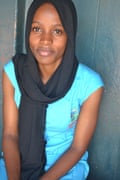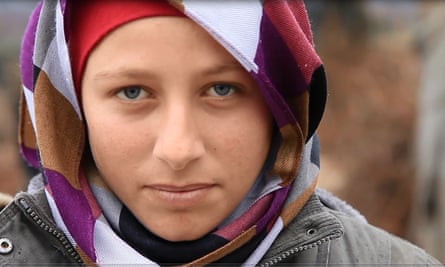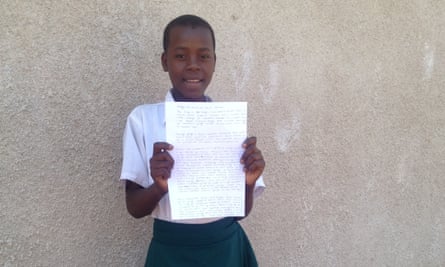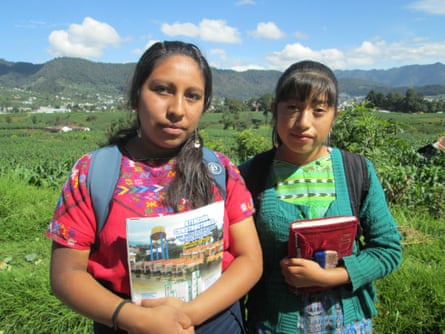Yuma, 15, Nicaragua
I understand the challenges young people face. I am an only child who was raised by my mother, after my father left. I now live with my aunt, as there are more education opportunities in the main town.
It’s hard to be a girl where I live, as we are much more disadvantaged than boys. Men have all the power – especially at home – because they are the ones who make the decisions.
Acts of violence are common in my community. I’ve seen physical violence, trauma and bullying – much of which has taken place at the hands of gangs.
They loiter on the streets, harassing boys and girls and encouraging fights. When they see us girls, they walk towards us and try to touch our hips, our shoulders and our face. Gangs scare us. This kind of behaviour causes confidence issues and leads to a lack of self-esteem, especially for girls my age. If we wear tight trousers, we are harassed.
I am keen to continue learning and share my ideas with others. I feel confident that women can achieve all the things that men do. I am determined to keep learning and hopefully go to university one day to study psychology.
(Interview facilitated by Plan International)

Awazi Sophia, 15, Uganda
It is challenging being an adolescent girl in Uganda because some people, especially men and boys, tease you: whenever you pass by them, they will whistle at you or shout some words at you. But for me, I don’t mind about them, I continue with my life.
Another issue is that maybe parents may not give you enough advice on how to live as an adolescent or how to confront certain issues that may come your way. Some parents are too shy to tell us the realities of life as a girl.
I want to study hard and be an accountant. This is because I like mathematics and love to play with numbers.
But overall, I have hopes that being an accountant will help me earn money to take care of my three young sisters.
I would love it if Uganda worked on girl-child education and introduced programmes to help to make sure girls stay in school. What that means is that we need strict laws to punish those people marrying off young girls.
(Interview by Alon Mwesigwa)
Zeinab, 14, Lebanon

My name is Zeinab. I’m 14 years old, from Deir Ezzor. I came to Lebanon at the beginning of the year and on New Year’s Day, I got married. I’ve been married for almost a year now.
I wanted to be a painter. It was my dream, but Syria is destroyed and that dream won’t be fulfilled. If I had the choice, I would have delayed it. I wanted to be a painter, but I had to be protected. That’s why I was married.
The situation in Syria is not good. All I want is to go home and have peace in Syria. I had everything in Syria, but nothing here. I was comfortable and happy before because our country is heaven. I used to go to school, play, joke … we did everything. And now, I’ve got no food, no house, and no mattresses to sleep on.
Here, I’ve met another Syrian girl, who’s a year older. She’s also been married for two years now. We bonded because we both married young. Now that I’m married, I feel like I’m going to be a mother.
(World Vision)

Eva, 15, Tanzania
My dream is to be an educated girl because there is nothing we can enjoy without education. I want to see every single girl in the world being educated so we can all achieve our big dreams.
This year I finished my primary education. It’s not been easy – my parents have not always been able to pay for my uniform and textbooks – but I did it and I’m really proud. I will do whatever it takes to graduate from any university so that I can achieve my dream to become a policewoman and take care of the community.
It is difficult to study at night because we don’t have power and I can’t go through my notes in darkness. I spend almost the whole day at school without having any meals and it makes me lose my concentration.
I am worried that it will affect my performance and I won’t be able to pass my exams – but my father is working extremely hard to find more resources for my studies and I won’t let him down. (Restless Development)

Emelin, 15, Guatemala
I live in the rural highlands of Guatemala in a mostly indigenous community. Life for me and other adolescent girls is hard, and we are determined to make things better.
Our biggest problems are early pregnancy and childbirth, sexual violence, lack of access to education, and access to healthcare. Approximately half of adolescent girls here have their first baby before the age of 18, and only about 14% finish secondary school.
This is because girls are not valued or respected. So two years ago, my friend Elba and I together with other youth decided to do something to try to help girls like us. After attempting to meet our town’s mayor, we met with a Let Girls Lead mentor who taught us about self-esteem, human rights, community organising and public speaking.
We used our new skills to make an impression on our village. We were interviewed in the newspaper, and television and radio covered our campaign. Finally the mayor did pay attention to us, and soon signed into legislation a new municipal policy to fund education and healthcare efforts for girls.
We adolescents are important because we are the present and future of our country. We have a voice and will use it, because the rights of indigenous women and girls are also human rights.
Based on these experiences, I would like to become a leader of my country when I grow up, so that I can help make a difference for girls in Guatemala.
(Let Girls Lead)

Sharmin, 15, Bangladesh
I want to be a special branch detective so I can catch smugglers. As a teenager I feel I am a part of the future of this country and I have a responsibility towards it. Our country needs a change in mindset so that people can acknowledge that each girl has a right to dream and achieve whatever she wants to.
Positive thinking and encouragement from family, school and college can play a pivotal role in enabling girls’ ability to flourish.
The major difficulties that girls of my age face are sexual harassment in public places, and child marriage. Both need to be strictly dealt with by the government. Our legislators have to take measures to ensure the safety and security of girls in our country. We need to make men of our country understand these issues.
I have participated in discussions arranged within our Beltola Club, one of Brac’s adolescent development clubs, where we have discussed a girl’s right to pursue her dreams. Being a member of the club has helped me develop my own perspective towards life and given me the strength to voice my opinion. I know what I want and I can reason with my parents. I believe confidence and aspiration can take a person a long way.
(Brac)

Fatmata, 15, Sierra Leone
When I finish school I want to be a lawyer because I want to take action for children. Especially for pregnant children. The biggest problem facing adolescent girls in Sierra Leone is pregnancy.
If you are 15 years old, you are still a child, and some men want to come and love you. They try to trick you saying that they love you. This is a big problem. They tried with me, but I don’t love them. If someone comes and tells me they love me, I will not accept it because I am going to school and I want to learn and concentrate on my school books.
It happened to one of my sisters. She got pregnant, had a child and had to drop out of school. She was in form one and had to stop. The man paid bride price and married her. She is at home now, even though she wants to go to school. She is 18 now, and the baby is two years old. She got pregnant at 15.
I did not feel good about my sister. I am angry because she had to drop out of school when she got pregnant. I am angry at the man for getting my sister pregnant. When I see her now I just don’t feel fine because she should be in school, not raising a baby.
My biggest challenge is with regard to school fees because my parents can’t afford to pay for me. My uncle pays for my school and supplies. He doesn’t complain, but it is still a challenge because I have to ask. I am worried about the future and how I will pay for college fees and books. That is my biggest worry.
(Unicef)

Raneem, 15, Jordan
Even before the war, life wasn’t easy for girls in Syria – but we felt safe, we felt protected. Parents chose girls’ schools near the home. My school was only a 10-minute walk. It was normal for me to go alone.
Here in Jordan, many Syrians cannot go to school. Some families do not want their daughters walking long distances in a foreign place, but for others, like me, it’s too expensive. I had very good marks at school, but we do not have money for books or uniforms. We must use it for rent, electricity, food.
My future has changed because I can no longer go to school. I received scholarships the past two years in Jordan. But not this year. My father has visited every charity asking for scholarships. He tries so hard to help me.
I remind myself of girls in Syria who have been without education for four years. My situation is not so bad. Some girls enter into early marriages because the situation is so difficult.
I have found a lot of support from my father and brothers. Leith was four years older than me, but he always asked my opinion. He was killed during a bombing raid, he was only 17. Another brother, Anis, was shot by soldiers. They both wanted to see me succeed. They were not just my brothers, they were my friends.
I hope to be a pharmacist – but once I return to Syria, I will also write a history of what happened to our country. It is important to record this.
(Care International)
